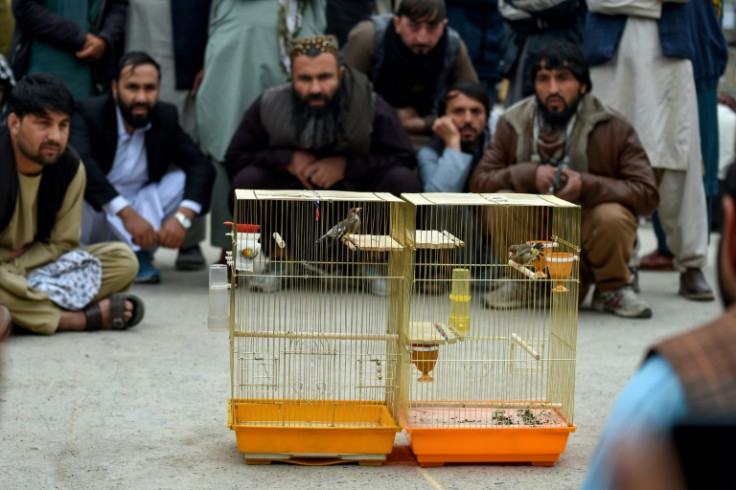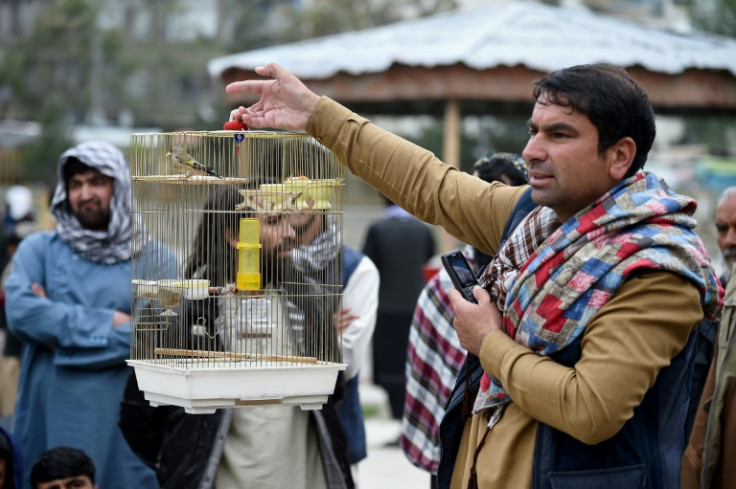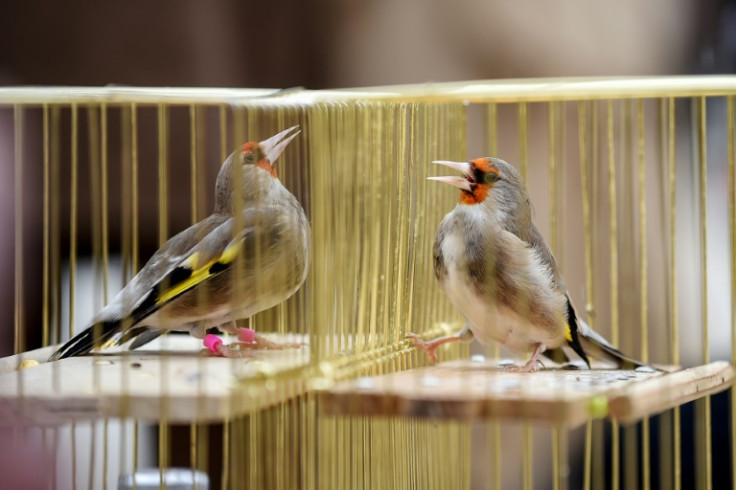Whistles At Dawn: Birdsong Duels Enthral Afghans

Just after sunrise on the Afghan day of rest, two goldfinches puffed their chests and belted a song, surrounded by men straining to hear which chirped stronger in an age-old pastime.
Every Friday, weather permitting, hundreds gather on a derelict basketball court in west Kabul, pitching pet birds against each other in a test of tweets and trills.
"Life is short, so we need to enjoy it," said 50-year-old Jamaluddin, who goes by only one name.
"This is what excites me and gives me peace of mind."
Under the Taliban government, entertainment options have drastically shrunk in line with their austere interpretation of Islam.
The authorities have also warned against betting -- once a roaring trade on the sidelines of birdsong duels -- but the competitions remain immensely popular.
"The human mind is made to chase happiness," said 42-year-old spectator Ahmad Wahid Dostyar.
"I have come here to spend some good time and calm my mind."
The bird owners remove cage shrouds and hand their avian champions to a pair of referees who hold them aloft to spectators.
As the cages are placed side-by-side on a chalk "X", the crowd falls quiet. The birds -- all male, like the human onlookers -- flit onto perches just a beak-length apart.
Then they start singing in jittery dominance displays.
The rules are simple: the first to stop loses.
An umpire counts the silenced bird to 10, like a boxing referee after a knock-out, and the winner is declared.
The Afghan obsession with birds runs deep, with bird-related hobbies enjoyed across ages, ethnic groups and regions.
Peacocks and ducks call out in Kabul's cafes and the competition-minded collect chickens and quail for fighting.
The capital is built around a bustling tumbledown bird market and, when invited into a home for tea, it is common for polite conversation to be overlaid by the chatter of songbirds.
Hundreds of self-described "goldfinchers" have no problem peeling themselves out of bed at dawn for competitions on Fridays -- the only full day off in the Afghan week.
A bird's worth can rise and fall on its tune.
The cheapest can be bought for around 500 Afghani ($7).
However, last year a bird that sang in Kabul for four minutes and 44 seconds was sold for around $1,000.
Some say prices go as high as $3,000 for an animal no larger than a playing card -- a huge sum in a country where the United Nations says 85 percent of the population lives on less than a dollar a day.
Saeed Nasim Hashimi paid about 20,000 Afghani for his bird, -- a winner on a recent Friday which was rewarded with four miniature goblets of feed in its cage.
"My little goldfinch won, and he is a champion," he boasted.
"He has a reputation among the other goldfinchers," added the 30-year-old.
A bird's worth jumps when it wins a contest, but it is not all about money for Hashimi.
"If something fulfils someone's passion, it has a lot of worth... it is priceless," he said.
Goldfinchers use various methods to try to coax the most song from their animals.
They feed their birds special seeds -- different types in different seasons -- take them out to gardens or forested areas to encourage their singing and do not allow them to mate.
On the playground surrounding the basketball court, dozens of mini-fridge-sized bird cages are dotted around.
Waiting to compete, the yellow-and-red streaked birds are kept subdued in the dark by cage covers patterned in tartan, sequin and paisley.
Nearby, children play cricket as an elderly goldfincher pulls off a cage cover marked with the warning: "Keep your distance."
He affectionately clucks at the bird as he brings it forward to compete.
During the workday, Waris Hajizada is busy selling curtains.
But on Friday mornings, he plays a critical role as a referee, adjudicating the birdsong duels inside a circle of squatting and squinting spectators.
It requires a keen ear but also "you need to know and understand the bird", insisted the 27-year-old.
"They have their own breeding, they have their own families. Those who are passionate, they know the genuine one who can sing more.
"The hard work, troubles, and care for the bird is all because we want the bird to sing more and more."





© Copyright AFP 2025. All rights reserved.





















